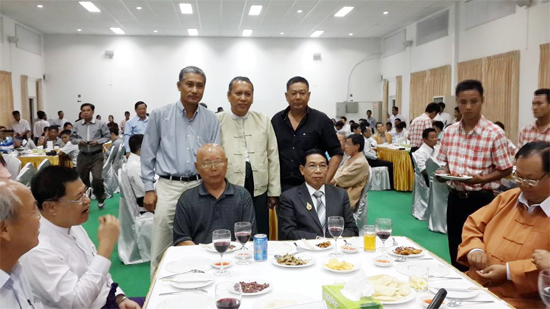A joint statement issued yesterday by the Karen National Union (KNU) and the Restoration Council of Shan State (RCSS), apparently in response to the United Nationalities Federal Council (UNFC) proposal on Saturday, 13 July 2013, said mediation between armed ethnic groups and the Thein Sein government would not be fair if conducted by National League for Democracy (NLD) leader Aung San Suu because she is a key stakeholder in the peace process.
“The dialogue process in Burma is very complicated, with multiple stakeholders simultaneously involved. This is not conducive to use of a single mediator. To overcome this situation, the National Dialogue process designed by ethnic armed groups enables all stakeholders to address their concerns without the use of mediators. As the process matures, stakeholders can request to utilize mediators or facilitators for specific discussions. Normally, stakeholders do not act as mediators or facilitators,” read the statement.
 The National Dialogue process, as mentioned in the statement, has been jointly developed by 18 UNFC and non-UNFC organizations since February 2012, and circulated among the groups for perusal in April this year. A copy of it was presented to the government supported Myanmar Peace Center (MPC) on 13 May by the KNU and the RCSS.
The National Dialogue process, as mentioned in the statement, has been jointly developed by 18 UNFC and non-UNFC organizations since February 2012, and circulated among the groups for perusal in April this year. A copy of it was presented to the government supported Myanmar Peace Center (MPC) on 13 May by the KNU and the RCSS.
Considering the act as a breach of trust and compounded by refusal by non-UNFC groups to have it represent them during the talks with the government, the UNFC pulled out of the joint work group, Working Group for Ethnic Coordination (WGEC), in a huff the following month.
One of the peculiar things, according to the joint 3-day meeting which ended yesterday, was that Mahn Mahn a KNU top member had led the technical team to meet the MPC in preparation for a formal meeting between the UNFC and the government’s chief negotiator U Aung Min. “He had not attended the framework for political dialogue workshops,” said a participant. “Had he attended, he wouldn’t have made the mistake of proposing mediators.”
Mahn Mahn’s prominent role in the UNFC had also embarrassed the KNU leadership. The new setup that was elected last year has been increasingly playing a minor role in the alliance that has steadfastly refused to talk to the government except in a third country.
“Please be patient,” a Karen leading participant said. “We will settle our affairs in order before long.”
Both the WGEC and the UNFC have announced that each will be holding another Ethnic Nationalities Conference, a follow-up to last year’s conference in Chiang Mai that had adopted a “6 point peace roadmap,” the latter on 29-31 July and the former sometime in the middle of August.
The remaining WGEC members say, in view of what is happening, a parallel Ethnic Nationalities Conference would only serve to confuse the people both at home and abroad. “We are not going to cut off our nose to spite our face,” said a participant.
An unconfirmed report however says the WGEC may be planning to hold a conference inside Burma.
The UNFC meanwhile has issued an invitation on 16 July to several groups and groupings to participate in its Ethnic Conference on Pece and National Reconciliation. They include the United Nationalities Alliance (UNA), the alliance of 1990 elections winning ethnic parties; and the Nationalities Brotherhood Federation (NBF), the alliance of the 2010 elections winning ethnic parties. It aims “to strengthen unity among ethnic nationalities” and “lay down common agreement for peace and politics,” among others.



